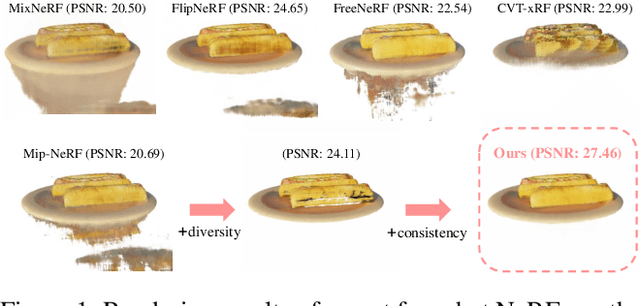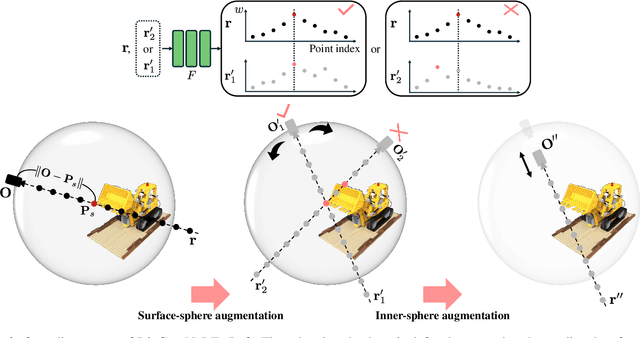Jae Won Jang
DivCon-NeRF: Generating Augmented Rays with Diversity and Consistency for Few-shot View Synthesis
Mar 17, 2025



Abstract:Neural Radiance Field (NeRF) has shown remarkable performance in novel view synthesis but requires many multiview images, making it impractical for few-shot scenarios. Ray augmentation was proposed to prevent overfitting for sparse training data by generating additional rays. However, existing methods, which generate augmented rays only near the original rays, produce severe floaters and appearance distortion due to limited viewpoints and inconsistent rays obstructed by nearby obstacles and complex surfaces. To address these problems, we propose DivCon-NeRF, which significantly enhances both diversity and consistency. It employs surface-sphere augmentation, which preserves the distance between the original camera and the predicted surface point. This allows the model to compare the order of high-probability surface points and filter out inconsistent rays easily without requiring the exact depth. By introducing inner-sphere augmentation, DivCon-NeRF randomizes angles and distances for diverse viewpoints, further increasing diversity. Consequently, our method significantly reduces floaters and visual distortions, achieving state-of-the-art performance on the Blender, LLFF, and DTU datasets. Our code will be publicly available.
Efficient and Privacy Preserving Group Signature for Federated Learning
Jul 15, 2022



Abstract:Federated Learning (FL) is a Machine Learning (ML) technique that aims to reduce the threats to user data privacy. Training is done using the raw data on the users' device, called clients, and only the training results, called gradients, are sent to the server to be aggregated and generate an updated model. However, we cannot assume that the server can be trusted with private information, such as metadata related to the owner or source of the data. So, hiding the client information from the server helps reduce privacy-related attacks. Therefore, the privacy of the client's identity, along with the privacy of the client's data, is necessary to make such attacks more difficult. This paper proposes an efficient and privacy-preserving protocol for FL based on group signature. A new group signature for federated learning, called GSFL, is designed to not only protect the privacy of the client's data and identity but also significantly reduce the computation and communication costs considering the iterative process of federated learning. We show that GSFL outperforms existing approaches in terms of computation, communication, and signaling costs. Also, we show that the proposed protocol can handle various security attacks in the federated learning environment.
 Add to Chrome
Add to Chrome Add to Firefox
Add to Firefox Add to Edge
Add to Edge